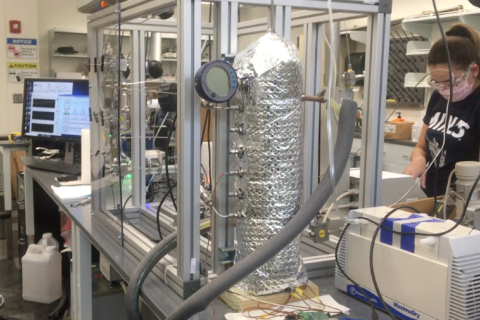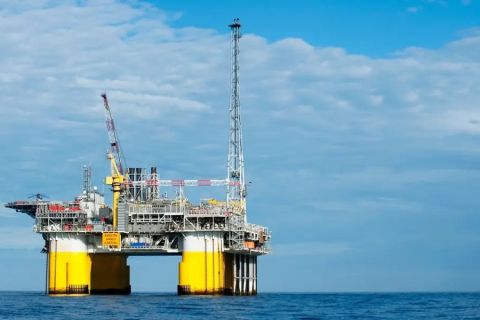Leading oil and gas companies sliced their U.S. exploration and development spending in 1999, but continued to shell out money for acquisitions, John S. Herold & Co. says in a new report. Its 33rd Reserve Replacement Cost Analysis also shows that the 50 largest producers, ranked by the size of their U.S. proved reserves, failed to replace their production for a second consecutive year, although their cumulative reserve-replacement rate improved to 98% in 1999 from 75% in 1998. In total, the companies reduced their capital expenditures by more than 25% to $22.2 billion in 1999 from $29.7 billion in 1998. The drop came entirely from a 36% decrease in E&D spending, which totaled just $15.6 billion in 1999. The largest E&D decrease came from Occidental Petroleum Corp., which chopped spending by $1.7 billion for a total of $226 million in 1999. The high E&D figure in 1998 was largely due to Oxy's acquisition of the Elk Hills Naval Petroleum Reserve, which was mostly attributed to unproved property purchases. The heaviest domestic E&D activity in 1999 came from Exxon Mobil Corp. and BP Amoco Plc at $1.5 billion each. However, that's still lower than their 1998 figures, which were $2 billion and $2.2 billion respectively. On closer examination, the exploration side of the E&D budgets took the biggest hit, falling for the first time since 1992. Exploration spending in the United States, which includes unproved property acquisitions such as Oxy's Elk Hills deal, fell nearly 50% to about $5 billion. Development spending dropped 28% to $10.5 billion. Proved acquisition expenditures increased by 25% to $6.6 billion, thanks mainly to Devon Energy Corp.'s purchase of PennzEnergy Co. That single deal accounted for almost 25% of the group's total proved acquisition activity in 1999. Other big spenders last year included Apache Corp. ($801 million) and Cross Timbers Oil Co. ($506 million). Large drops in acquisition spending were seen at Forest Oil Corp., Range Resources Corp., National Fuel Gas Co., Questar Corp., EOG Resources Co. and Houston Exploration Co. The six independents and oil and gas divisions of integrated natural-gas companies spent a combined $70 million in 1999, down from almost $1.3 billion in 1998. Oil reserves declined for the second year in a row, falling 0.2% to 18.1 billion barrels. Atlantic Richfield Co. added the most oil reserves at 298 million barrels. Union Pacific Resources Group Inc. was the only company to post negative oil additions, adding 12 million barrels through drilling, but losing 13 million barrels in reserve revisions. Gas reserves increased 0.7% to 94.1 trillion cubic feet. Coastal Corp. led this category, adding more than 1.2 trillion cubic feet to its reserves in 1999. While the producers reduced their E&D outlays last year, Herold also found that their total net income increased five-fold to $9.7 billion as revenues increased almost 16% from 1998 to $42.9 billion. The companies reported a 7.3% decline in their production costs-more than 30% fewer exploration expenses and nearly 25% less depreciation, depletion and amortization costs. In their best performances since 1995, U.S. reserve-replacement costs declined 42% to $5.13 per barrel of oil equivalent, while finding and development expenses declined nearly 60% to $5.18 per equivalent barrel, the report said. It indicated that acquisition costs increased 27% to $5.01 per equivalent barrel for the group last year. -Jodi Wetuski
Recommended Reading
Going with the Flow: Universities, Operators Team on Flow Assurance Research
2024-03-05 - From Icy Waterfloods to Gas Lift Slugs, operators and researchers at Texas Tech University and the Colorado School of Mines are finding ways to optimize flow assurance, reduce costs and improve wells.
AI Poised to Break Out of its Oilfield Niche
2024-04-11 - At the AI in Oil & Gas Conference in Houston, experts talked up the benefits artificial intelligence can provide to the downstream, midstream and upstream sectors, while assuring the audience humans will still run the show.
The Pandora's Box of AI: Regulation or Self-governance?
2024-04-04 - Experts urge policymakers to learn from the failure to rein in the internet and move quickly to regulate AI.
TGS, SLB to Conduct Engagement Phase 5 in GoM
2024-02-05 - TGS and SLB’s seventh program within the joint venture involves the acquisition of 157 Outer Continental Shelf blocks.
2023-2025 Subsea Tieback Round-Up
2024-02-06 - Here's a look at subsea tieback projects across the globe. The first in a two-part series, this report highlights some of the subsea tiebacks scheduled to be online by 2025.





